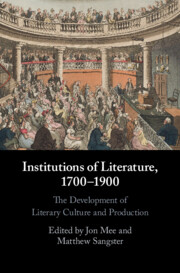Book contents
- Institutions of Literature, 1700–1900
- Institutions of Literature, 1700–1900
- Copyright page
- Contents
- Figures
- Contributors
- Acknowledgements
- Introduction Literature and Institutions
- Chapter 1 Knowledge Exchange in the Seventeenth Century
- Chapter 2 ‘Supporting Mutual Benevolence’
- Chapter 3 Institutions without Addresses
- Chapter 4 Eighteenth-Century Musenhof Courts as Bridges and Brokers for Cultural Networks and Social Reform
- Chapter 5 Becoming Institutional
- Chapter 6 Circulating Libraries as Institutional Creators of Genres
- Chapter 7 Lecturing Networks and Cultural Institutions, 1740–1830
- Chapter 8 Catalogues as Instituting Genres of the Nineteenth-Century Museum
- Chapter 9 Charles Lamb and the British Museum as an Institution of Literature
- Chapter 10 A Disruptive and Dangerous Education and the Wealth of the Nation
- Chapter 11 ‘The Ladies’ Contribution’
- Chapter 12 ‘[L]etters Must Increase’
- Chapter 13 Networks, Nodes, and Beacons
- Chapter 14 The Book as Medium
- Index
Chapter 1 - Knowledge Exchange in the Seventeenth Century
From the Third University to the Royal Society
Published online by Cambridge University Press: 30 June 2022
- Institutions of Literature, 1700–1900
- Institutions of Literature, 1700–1900
- Copyright page
- Contents
- Figures
- Contributors
- Acknowledgements
- Introduction Literature and Institutions
- Chapter 1 Knowledge Exchange in the Seventeenth Century
- Chapter 2 ‘Supporting Mutual Benevolence’
- Chapter 3 Institutions without Addresses
- Chapter 4 Eighteenth-Century Musenhof Courts as Bridges and Brokers for Cultural Networks and Social Reform
- Chapter 5 Becoming Institutional
- Chapter 6 Circulating Libraries as Institutional Creators of Genres
- Chapter 7 Lecturing Networks and Cultural Institutions, 1740–1830
- Chapter 8 Catalogues as Instituting Genres of the Nineteenth-Century Museum
- Chapter 9 Charles Lamb and the British Museum as an Institution of Literature
- Chapter 10 A Disruptive and Dangerous Education and the Wealth of the Nation
- Chapter 11 ‘The Ladies’ Contribution’
- Chapter 12 ‘[L]etters Must Increase’
- Chapter 13 Networks, Nodes, and Beacons
- Chapter 14 The Book as Medium
- Index
Summary
Taking as its starting point a little-known text by George Buck entitled The Third Universitie (1615) and as its endpoint the early years of the Royal Society, this chapter explores seventeenth-century knowledge exchange, research networks and innovation. What began as a civic challenge to Oxbridge ended in an outward-facing institutional sphere that drew its inspiration, founding figures and key personnel from the archipelagic and colonial contexts within which its pioneering interests developed. The Royal Society’s origins lie in a range of institutions identified by Buck, including Gresham College; in later developments such as the Invisible College and the Hartlib Circle; and in the idea for a directory of expertise, or ‘Office of Address’. Colonial investors and adventurers hard-wired into emerging networks of experts working across collaborative communities of scholar-practitioners ensured the advancement of knowledge was intimately intertwined with political intelligence and economic exploitation. There was no new medicine without frontiers, no new husbandry without fresh fields to plant, and, crucially, no knowledge exchange without satire.
Keywords
- Type
- Chapter
- Information
- Institutions of Literature, 1700–1900 , pp. 24 - 43Publisher: Cambridge University PressPrint publication year: 2022



